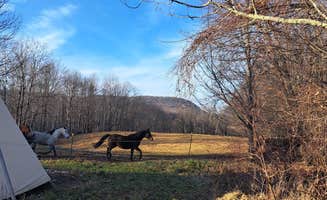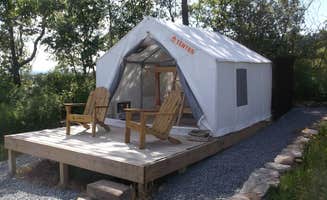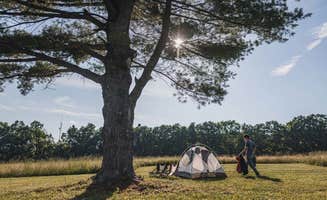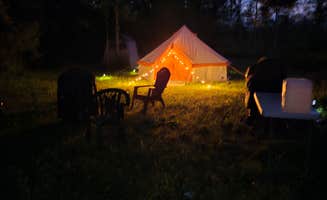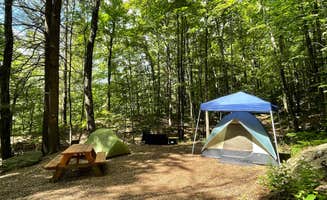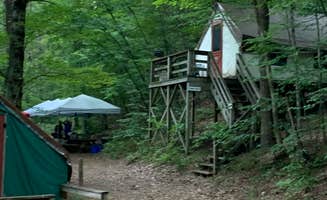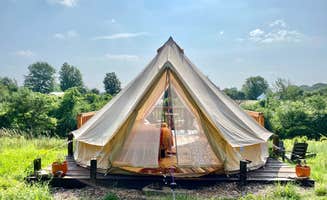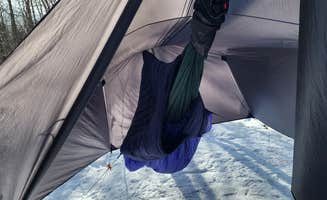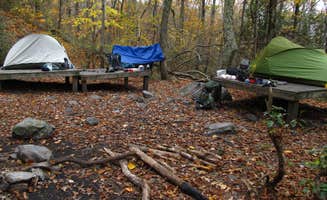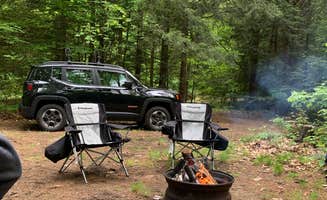Tent campsites near Watervliet, New York provide access to hiking trails through northern hardwood forests typical of New York's Capital Region. The area lies within the Hudson Valley watershed with campsites ranging from 200 to 1,800 feet in elevation. Winter camping opportunities exist at several locations with proper preparation for temperatures that can drop below 20°F from December through February.
What to do
Hike mountain trails: At Alander Trail Campground, located within Mount Washington State Forest, campers access sites via a 1.5-2 mile hike from the trailhead. According to Kay D., "You have to park at the entrance and hike in about 1.5-2 miles with everything on your back to get to the spots. Once you get there, theres quite a few sites to choose from and each offer quite a bit of privacy."
Explore off-road sites: Duck Pond Campsite requires navigating unpaved roads that may challenge larger vehicles. One camper notes, "The road in on old cemetery rd was pretty rough, so we decided to go out the other way, which was way worse. The site itself, was pretty nice, Fire pit, trickling stream, but the years taken off the life of my truck was not worth it."
Follow the Appalachian Trail: Brassie Brook Shelter sits along the iconic trail with tent camping options beyond the lean-to. Nora S. explains the approach: "We started our hike at the under-mountain trailhead, located right off route 41, and climbed up the mountain. Be prepared for steep inclines, and lots of rocks. After about a mile, you reach a trail intersection, stay left and continue up the hill."
Paddle accessible waters: Some primitive campsites provide water access, with several locations accommodating tent campers within walking distance of small ponds and streams for fishing or kayaking opportunities during summer months.
What campers like
Privacy at primitive sites: Alander Trail Campground provides secluded tent spots with key amenities. "It's completely free and it usually isn't too busy since most people don't like having to carry all their stuff in that far," notes Kay D., who adds these sites include "a semi-flat area for a tent, a fire pit and grill rack, one picnic table, and a bear box you would be sharing with other campers nearby."
Well-maintained facilities: Tent campers appreciate sites with basic amenities and cleanliness. Liz P. describes Alander Trail: "Although we were the only campers at the time the area was emmaculate and not one piece of trash on the ground anywhere! The outhouse was even clean!"
Natural surroundings: Echo Lake provides waterfront camping opportunities with hillside views. James A. reports, "Lake is surrounded by hills and there is a small lean two with a few campfire spots. Other campsites are scattered and require navigating through small overgrown trails (wear pants). We camped on the hill with a beautiful view of the whole lake and breeze."
Wildlife encounters: Primitive camping around Watervliet brings natural wildlife encounters. Kay D. mentions, "You will be in the heart of the forest/woods so definitely make sure to be prepared. We had some scares with coyotes and bears in the past but never anything crazy."
What you should know
Seasonal considerations: Many primitive tent sites near Watervliet remain accessible year-round but require additional preparation during colder months. Tina D. shares about Brassie Brook: "Our trip was sadly cut short because we were freezing and it was raining a lot LOL but hey it's part of the experience."
Access limitations: Terrain and road conditions affect site accessibility, especially after weather events. The L. warns about Duck Pond Campsite, "Intermittent cell service which was frightening while driving on these rough roads."
Availability concerns: First-come, first-served camping at popular sites can fill quickly during peak season. Kate notes about Echo Lake, "It does get a little crowded later in the day so you may have to share space with others and it can be a little noisy at night."
Site preparation: Many primitive tent sites require advance planning for supplies. Yae U. describes Duck Pond as "surprisingly well maintained beautiful campsites. The pond is small so the mosquitos were not too bad. So few people passed by and very unknown quite and we just loved the experience."
Tips for camping with families
Plan shorter hikes: When backpacking to tent sites with children, consider locations with shorter approaches. Annmarie J. describes Alander Trail Campground as a "beauitful camground that is about a mile hike from the trailhead."
Select sites with amenities: Families often prefer tent camping with basic facilities nearby. Zoar Outdoor offers more developed options with Dominick V. noting, "Amenities are well maintained. Could use a refresh but overall great experience."
Prepare for insects: Low-lying areas near water sources require additional insect protection. One camper notes about Echo Lake, "it can get swampy near the edge of the lake so you may want to bring bug spray."
Safety considerations: Bear boxes at primitive sites provide essential food storage. Liz P. highlights that Alander Trail has "bear boxes at each site!" while campers should "Leave NO Trace!" according to Nora S.
Tips from RVers
Size restrictions: Most tent campsites near Watervliet cannot accommodate larger recreational vehicles. Several dispersed sites specifically note they are "NO big-rig-friendly" with limited turnaround space.
Alternative options: While primitive tent camping dominates the area, Seth Warner Shelter provides accessible options for smaller campers and vans. Daniel S. notes this location is "about 6 miles from the nearest town. Great for overnight, section or through hike."
Road condition awareness: Access roads to primitive sites often present challenges for larger vehicles. The L. emphasizes Duck Pond Campsite requires "Small vehicle only" due to rough road conditions that caused concern even with a pickup truck.


